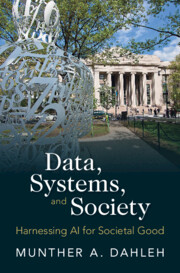Book contents
- Data, Systems, and Society
- Reviews
- Data, Systems, and Society
- Copyright page
- Contents
- Preface
- 1 The Pitfalls, Promises, and Challenges of Data
- 2 A Confluence of Fields
- 3 Who – and What – Should Drive Decision-Making?
- 4 A Transdiscipline Is Born
- 5 Complexity versus Relevance
- 6 The Care and Feeding of a New Discipline at MIT
- 7 People, Programs, and Research
- 8 Personal Reflections on the Journey
- Acknowledgments
- Bibliography
- Index
1 - The Pitfalls, Promises, and Challenges of Data
Published online by Cambridge University Press: 24 March 2025
- Data, Systems, and Society
- Reviews
- Data, Systems, and Society
- Copyright page
- Contents
- Preface
- 1 The Pitfalls, Promises, and Challenges of Data
- 2 A Confluence of Fields
- 3 Who – and What – Should Drive Decision-Making?
- 4 A Transdiscipline Is Born
- 5 Complexity versus Relevance
- 6 The Care and Feeding of a New Discipline at MIT
- 7 People, Programs, and Research
- 8 Personal Reflections on the Journey
- Acknowledgments
- Bibliography
- Index
Summary
This chapter delves into the complexities and challenges of data science, emphasizing the potential pitfalls and ethical considerations inherent in decision-making based on data. It explores the intricate nature of data, which can be multifaceted, noisy, temporally and spatially disjointed, and often a result of the interplay among numerous interconnected components. This complexity poses significant difficulties in drawing causal inferences and making informed decisions.
A central theme of the chapter is the compromise of privacy that individuals may face in the quest for data-driven insights, which raises ethical concerns regarding the use of personal data. The discussion extends to the concept of algorithmic fairness, particularly in the context of racial bias, shedding light on the need for mitigating biases in data-driven decision-making processes.
Through a series of examples, the chapter illustrates the challenges and potential pitfalls associated with data science, underscoring the importance of robust methodologies and ethical considerations. It concludes with a thought-provoking examination of income inequality as a controversial example of data science in practice. The example highlights the nuanced interplay between data, decisions, and societal impacts.
- Type
- Chapter
- Information
- Data, Systems, and SocietyHarnessing AI for Societal Good, pp. 1 - 18Publisher: Cambridge University PressPrint publication year: 2025

